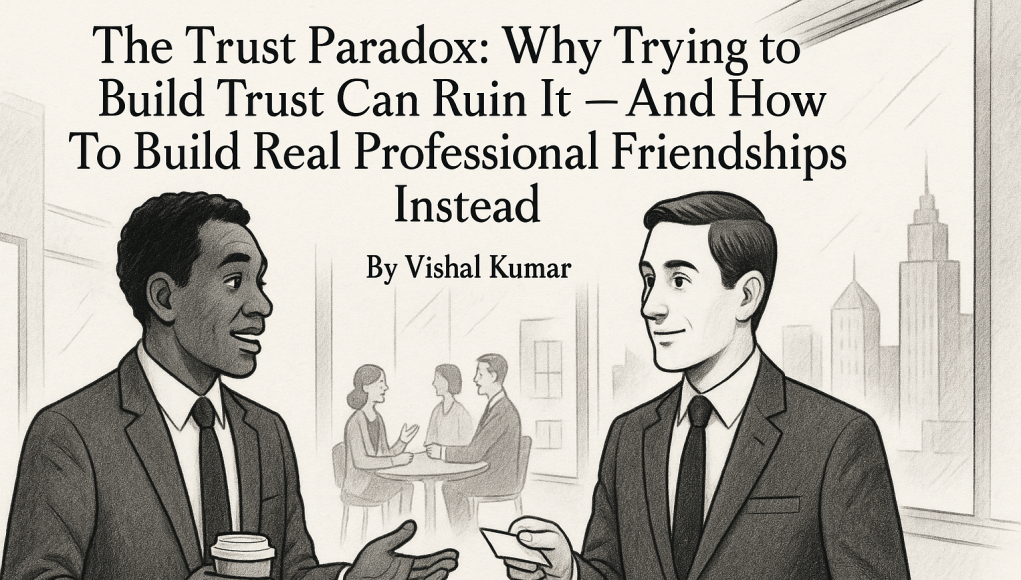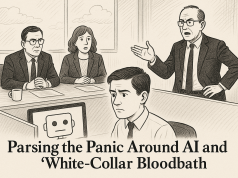There’s a peculiar irony in human relationships: the harder you try to be trusted, the less likely you are to succeed. This is the trust paradox — a strange psychological boomerang where your efforts to secure confidence trigger suspicion instead.
It’s not new. Shakespeare hinted at it when he wrote, “The lady doth protest too much, methinks.” We’ve all met that over-eager colleague or LinkedIn connection who assures you — unsolicited — of their integrity, competence, and “genuine passion for synergies.” And yet, something doesn’t sit right.
Trust, much like respect, is rarely won through declaration. It’s earned in the quiet moments, the unspoken gestures. In this way, trust behaves more like a cat than a dog. Call it by name, and it slinks away. Ignore it, and it hops into your lap, purring.
The Networking Delusion
In professional circles, this paradox manifests in what I call “networking theater.” Rooms filled with people exchanging smiles and business cards, each subtly signaling, “You can trust me.” The paradox, of course, is that this very signaling breeds skepticism.
At TAO.ai, we’ve observed this dynamic in every community we build. People long for meaningful professional relationships, yet most approach them with the transactional coldness of a vending machine. Insert connection request, expect immediate trust.
It doesn’t work.
Because professional friendships — the kind that propel careers and build lasting ecosystems — aren’t forged in the transactional furnace. They’re grown in the slow, organic soil of shared experiences, reliability, and mutual upliftment.
Lessons from the Forest Floor
Nature, as always, offers a masterclass. Beneath every thriving forest lies an invisible web of fungal networks — the mycorrhizae. These fungi connect trees, ferrying nutrients, sharing resources, even warning each other of impending threats. They don’t proclaim their trustworthiness. They simply act in the interest of the whole ecosystem.
This is how professional trust should function. Quiet. Consistent. Mutual.
Leaders who grasp this — who become the “fungi” of their networks — end up cultivating deeper, more authentic professional friendships. They create value without keeping score, and over time, that value circles back, often amplified.
Fast-Tracking Trust, The Slow Way
Ironically, the fastest way to build trust is to stop trying to build it and start being useful, empathetic, and reliable.
At TAO.ai, our Worker1 philosophy embodies this. We encourage individuals to focus on three simple tenets:
- Be Authentically Helpful: Offer assistance without an agenda.
- Invest in Micro-Moments: Small acts of kindness compound into profound trust.
- Let Reciprocity Happen Organically: Trust, once seeded, grows exponentially when nurtured with patience.
It’s not glamorous. There are no shortcuts. But it’s remarkably effective.
From Contacts to Companions
In the age of hyperconnectivity, where everyone is a message away, the real differentiator isn’t how many people know your name. It’s how many people feel known by you.
Professional friendships that stand the test of time are built on this foundation — not on pitch decks and elevator speeches, but on shared struggles, honest conversations, and a relentless commitment to mutual growth.
We must evolve from building ego-systems to nurturing ecosystems.
The Virtuous Cycle
Much like the forests that thrive through cooperation, organizations and individuals flourish when trust becomes a byproduct of collective growth, not a precondition demanded upfront.
When we focus on uplifting others, we inadvertently uplift ourselves. This is the virtuous cycle I’ve dedicated my work to — whether through TAO.ai, the HumanPotentialIndex, or our community initiatives.
The trust paradox isn’t a hurdle. It’s a compass. It points us toward the kind of leadership, collaboration, and friendship that doesn’t just survive in the marketplace — it transforms it.
So next time you’re tempted to say, “Trust me,” pause.
Instead, ask: “How can I help?”
Trust will find its way to you.
In the grand marketplace of professional relationships, trust is the one currency you cannot counterfeit. You can fake credentials, inflate metrics, and polish pitches, but trust? It stubbornly resists shortcuts.
Working through the trust paradox isn’t about gaming perception — it’s about earning reputation through patience, empathy, and relentless usefulness. It’s the slow art of being consistently valuable when no one’s watching.
The irony is, those who invest in being trustworthy instead of demanding trust are the ones who scale faster, build stronger alliances, and unlock growth that lasts.
Much like a thriving forest, your professional ecosystem flourishes when you focus on nurturing connections, not harvesting favors.
So, the next time you’re tempted to ask, “How do I get them to trust me faster?” — flip the script.
Ask instead: “How can I be of service today?”
In that question lies the quiet power to build trust — fast and forever.


















![From TAOLabs: A New, Simplified Way to Learn in the Age of Chaos [30m60h90d] From TAOLabs: A New, Simplified Way to Learn in the Age of Chaos](https://theworktimes.com/wp-content/uploads/2025/05/ChatGPT-Image-May-13-2025-01_11_22-AM-238x178.png)







